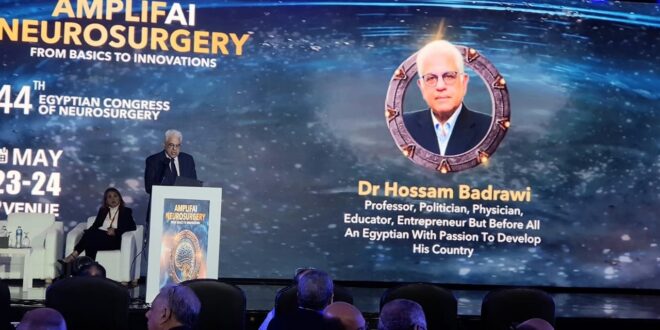At the invitation of the Egyptian Society of Neurosurgery, in cooperation with the Eye Advertising Technology Services Foundation, today, Thursday, May 23, 2024, at the headquarters of the Conrad Cairo Hotel, Dr. Hossam Badrawy delivered the opening honorary lecture for the 44th Conference on Neurosurgery, which is organized by the Egyptian Society of Neurosurgery (ESNS) under the slogan: Artificial Intelligence is one of the basics. To innovations, as the pioneer of education in Egypt.
During his speech, Dr. Badrawi presented his vision about the role of artificial intelligence in health care and the revolution it will bring about in neurosurgical practices, enhancing results and overcoming many challenges. Dr. Badrawy also focused on the most important skills that young people need to work now and in the future, represented by working within teams, communication skills, Flexibility, the ability to adapt to change, digital skills, computer experience, and knowledge of a second language in addition to Arabic, stressing that there is no chance for someone who lacks these skills to find a place in the labor market today and in the future.
Dr. Badrawi also pointed out that many jobs will become extinct and new jobs will appear, stressing that the jobs that will appear can absorb what will disappear.
Nowadays, doctors also have to work in a team and focus on primary care specialties. Without this, the new health insurance system, which requires doctors to have digital skills and communication capabilities, will not succeed.
Dr. Badrawi also stated that specializations will completely change with the development of new work platforms. He gave, for example, that there are specializations that we did not know before, such as virtual reality developers, self-driving vehicle engineers, vertical agriculture specialists in cities, and green transformation jobs. In addition, there are roles such as data analysts, computer systems analysts, information security specialists, code creators and analysts, digital marketers, and software designers. Dr. Badrawi then lamented that most of these new specialties do not have educational curricula or training programs in schools and universities. . Instead, big companies are preparing young people for these roles, not traditional educational institutions.
.
Dr. Badrawi pointed out that there are some terms that are frequently used, but many may not understand their meanings. He gave an example of the word “automation,” which is a newly coined and Arabized term that means automatic operation and refers to anything that works independently without human intervention. Automation can be described as Use computers, processor-based devices or controllers and software in various industrial, commercial and service sectors to ensure processes and processes run automatically, accurately and correctly with minimal errors. In short, automation is the art of performing processes, machines work automatically with greater efficiency and less time, without human intervention, as well as “digitization” which is the conversion of written, spoken, audio and visual communications into digital electronic messages that everyone can understand and that can be saved and retrieved quickly and easily.
Dr. Badrawi then presented the difference between artificial intelligence and regular technology, also known as classical computing, as it relies on a specific set of instructions or algorithms to perform tasks. The output of classical computing depends on the inputs given to it, while artificial intelligence simulates human intelligence in performing many tasks and can It should also develop on its own, stressing that artificial intelligence is a tremendous opportunity for progress and service to humanity, and it cannot be stopped.
Dr. Badrawi concluded his speech by saying that in the era of artificial intelligence, we stand on the same line as everyone else and that there is an opportunity for us to keep pace with humanity at the same moment, stressing the necessity of changing traditional education, as the labor market is moving forward at the pace of development and innovation, in contrast to what educational institutions are doing.
Dr. Badrawi then thanked those present, as the attendees expressed support and approval for Dr. Badrawi’s speech.
He attended the conference’s speakers’ podium
Dr. Ibrahim Owais, Secretary General of the Egyptian Society of Neurosurgeons
Dr. Hazem Mostafa, Secretary General of the Egyptian Society of Neurosurgeons
Dr. Ashley, US Congressman
Artist and media personality Madeleine Tabar
Dr. Osama Abdel-Hay, head of the Medical Syndicate
Dr. Walid Anwar, Secretary General of Hospitals
Dr. Ahmed Ezz, Chairman of the Board of Directors of Cleopatra Hospitals
Dr. Ahmed Salama, Regional Director, MEA
Dr. Samer Al-Rifai, founder of the Arab Society for the Development of Pharmacists
It is worth noting that the conference is considered one of the most important scientific events in neurosurgery in Egypt and the Arab region, and it also reflects the development and transformative power of artificial intelligence in restarting the field of neurosurgery.
The conference brought together an elite group of neurosurgeons from Egypt and from various countries of the world to discuss the latest developments in this field. The conference witnessed the presence of 22 guests from 8 foreign countries (the United States – Canada – England – Austria – Colombia – Brazil – Poland – Croatia) and 4 Arab countries (Saudi Arabia – UAE – Kuwait – Jordan), where 14 specialized workshops will be held during the conference

 Dr. Hossam Badrawi Official Website
Dr. Hossam Badrawi Official Website

